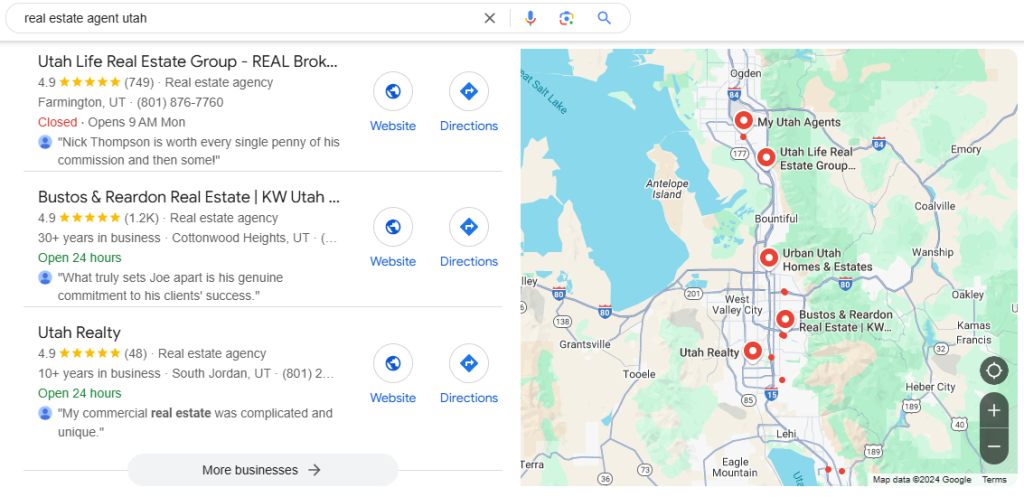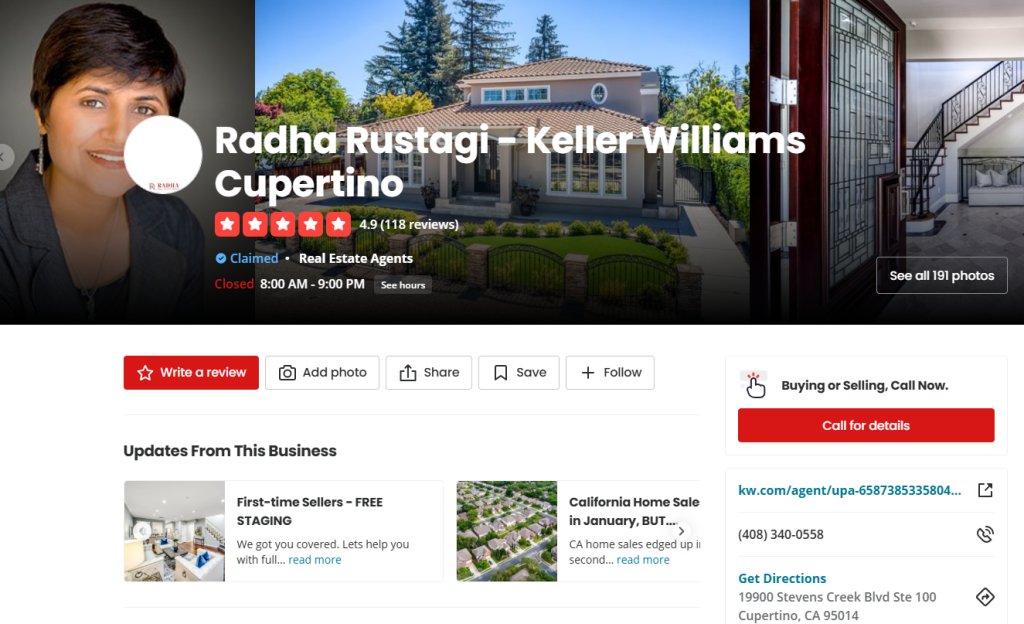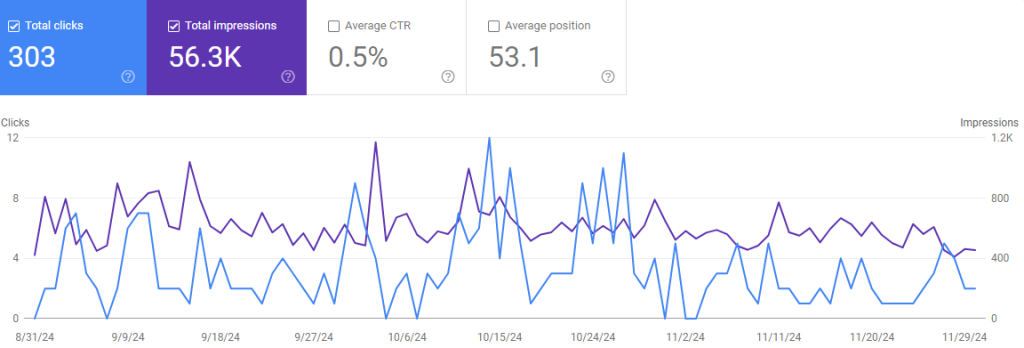A Comprehensive Guide To SEO In Real Estate Brokers And Agents

The real estate industry is highly competitive. If you want your business to stand out, your website must be visible in search engine results when people look for your services.
Being visible online as a real estate professional is essential because 68% of clicks go to the top three organic search results on Google, so you need to land the number one spot. Search engine optimization (SEO) can help you achieve this.
If you want to generate leads and attract potential clients, you need to optimize your real estate website for search engines.
However, real estate SEO can be complex, with over 50% of marketers struggling to keep up with it.
In this article, we’ll guide you through everything you need to know about real estate SEO. We’ll also provide some practical steps you can take to get SEO for real estate right.
What Is SEO and Why Is It Important for Real Estate?

Over 97% of homebuyers use the internet in their home search, so you need to show up in Google search results if you want to be the first person they contact.
SEO is the process of improving your real estate website so that it appears higher in search engine results pages (SERPs).
It involves optimizing various elements of your website, such as the content, structure, and technical performance, to improve its search engine visibility and rank higher for relevant keywords.
For example, if someone searches for “homes in Utah,” a search engine-optimized real estate website can appear at the top of the results, increasing the chances that potential buyers will visit your website.
It’s possible that this real estate site has been optimized for SEO as it’s showing up as the first result when we search “homes to buy in Utah”:

Below are some key reasons why SEO is so important in the real estate industry:
Increases online search visibility
As mentioned earlier, the majority of homebuyers search online. SEO helps your real estate business appear at the top of the search results when they do this, making it easier for potential clients to find your property listings and services.
Attracts local clients
As you know, real estate is a highly location-specific business. Local SEO techniques, such as optimizing for “near me” searches and creating a Google Business Profile (GBP), help your business target individuals in your specific area.
Generates high-quality leads
Almost 30% of marketers consider organic search as their top lead-generation tactic. Unlike traditional advertising, SEO targets people actively searching for real estate services like yours, whether they’re buyers or sellers. This ensures that organic traffic to your website is more likely to convert into paying clients.
| What Is Organic Traffic? Organic traffic refers to visitors who arrive at your website without you paying for them to do so through Google Ads, for example. These visitors find your site because it appears in the SERPs for what they’re looking for. |
Cost-effective marketing
The return on investment (ROI) of SEO for the real estate industry is 1,389%, making your SEO efforts worthwhile. Compared to paid advertising, for example, SEO is a cost-effective strategy that offers long-term results.
Once your website starts ranking in the SERPs, it continues to attract organic traffic without the ongoing cost of advertising campaigns.
Showcases your listings and expertise
A strong real estate SEO strategy can highlight your real estate listings and blog content, such as neighborhood guides or tips, positioning you as an expert in your market.
What Happens When Someone Googles a Real Estate Business?

Google Search uses web crawlers to explore the internet and discover web pages. These crawlers regularly scan websites and gather information to add to Google’s index, which serves as a database of all the pages the crawlers find.
If your real estate website isn’t included in this index, it won’t appear in Google’s search results.
The process of how Google search works involves three main steps, and part of real estate SEO is ensuring your website successfully navigates each stage:
- Crawling: Automated tools called crawlers scan the internet, collecting text, images, and videos from web pages they encounter.
- Indexing: Google automatically analyzes text, image, and video files on each page and stores them in its index.
- Search results: When a user searches for something on Google, the search engine pulls relevant information from its index to deliver results that match the user’s query.
| Should I Only Optimize for Google? Although optimizing your website for other search engines is crucial, Google dominates as the number-one search engine, with an 81% global market share. |
How Does Google Rank Websites in Search Results?

Several key factors determine how Google ranks and displays websites in its search results, including:
Authority
Authority means how credible and trusted your website is. Backlinks and your overall reputation within your industry often influence this. We’ll discuss links from trustworthy websites later in this article.
Content quality
Google prioritizes websites with high-quality, accurate, useful, and well-written content. This ensures that users get valuable information, which we’ll cover in more detail later. A real estate website with helpful, engaging, and relevant content is more likely to rank well in search results.
Relevance
Google aims to match search queries (what users type into search engines) with the most relevant results.
For example, if someone searches for “real estate agent near me,” Google looks for relevant pages that address real estate services in the user’s specific location.
The closer your content aligns with what users are searching for, the higher your website will rank.
5 Important Factors You Need to Understand for Real Estate SEO

There are various vital aspects of real estate SEO that you need to understand before you can get started:
1. Keywords
Real estate SEO keywords are the words or phrases people type into search engines when looking for something.
For example, if someone wants to find a local real estate brokerage, they might type in “real estate brokerage near me”. This phrase is known as a keyword.
When creating content for your website, integrating the right real estate keywords helps search engines understand what your site is about.
If your site uses the same keywords that users are searching for, it’s more likely to appear in the SERPs.
2. Local SEO
More than 45% of Google searches have local intent, meaning users are looking for something nearby. The search engine knows that your real estate services are location-dependent and that people will be looking for nearby brokerages.
Local SEO is the process of optimizing your online presence to attract more business from local searches.
When someone types “real estate services near me” or “real estate agent in [area name]” into a search engine, local SEO ensures that your business shows up in those SERPs.
3. On-page optimization
On-page optimization refers to all the actions you can take on your website to help Google understand it and its content.
4. Off-page optimization
Off-page optimization refers to the things you can do to build your website’s reputation outside of on-page SEO to make it more trustworthy and authoritative.
One off-page optimization tactic is building backlinks. Backlinks are like recommendations from other websites. When another site links to your real estate website in its content, known as a backlink, it shows search engines that these sites trust yours, giving you more authority.
For example, if you publish a blog post about the best ways to stage your home for an open house, a home staging company may link to this article in its content because it’s useful to its customers.
5. Technical SEO
Technical SEO is the work you can do on your website that helps Google find, crawl, understand, and index your site more effectively.
Your technical SEO efforts will not be visible to your visitors, but they can help you rank higher in the SERPs.
How to Optimize Your Real Estate Website for Search Engines
Now that you understand how Google works and the key components behind real estate search engine optimization, let’s look at some real estate SEO tips to improve your search rankings:
Create great content
Creating high-quality content is essential to getting your website crawled, indexed, and displayed in search results.
Regularly updating your site with fresh content, like blog posts, encourages search engine crawlers to visit it more frequently.
By naturally including relevant target keywords within your content, you can help Google understand the focus of your website.
Search engines favor well-researched, in-depth, authoritative content that provides comprehensive coverage of a topic, as it’s seen as more valuable for users.
Here is how you can develop high-quality content that gets Google’s attention:
Conduct keyword research
The foundation of creating effective content starts with keyword research. This process involves identifying and analyzing the words and phrases people use when searching for real estate services like yours.
Keyword research helps you pinpoint the terms to target in your website’s content, increasing your chances of reaching your target audience and improving your rankings in the SERPs.
It also provides insights into what your potential clients are searching for, enabling you to develop content that directly addresses their needs and answers their questions.
You can use tools like Google Keyword Planner, Ahrefs, or Semrush to conduct keyword research. Here’s how you can use Ahrefs to do keyword research:
- Come up with a few ideas: Start by using your understanding of your audience. Consider the questions they often ask and the solutions they’re looking for. You can then use these ideas to form a list of potential keywords.
- Start with a seed keyword: Enter a broad search term related to your business, such as “real estate agent Colorado,” to generate related keyword suggestions.
- Evaluate keyword metrics: Ahrefs will provide data on metrics like search volume—which is how often a keyword is searched monthly—and keyword difficulty (KD)—which measures how competitive a keyword is to rank for. Look for keywords with a good balance of high monthly search volume, good user intent, and low competition to maximize your chances of success.
Below is the search volume and KD for “real estate Colorado.” As you can see, this could be a difficult keyword to rank for, but it has high search volume:

- Look for keywords that work: Ahrefs will suggest keywords related to what you’ve entered. This can help you find additional long-tail keywords that could be relevant to your real estate site and content.
Here you can see the additional keywords and questions that Ahrefs has generated based on our keyword “real estate Colorado”:

- Analyze the SERPs: Next, look at the current top-ranking pages displayed by Ahrefs for the keyword you’re researching. These pages will help you understand what your competitors are doing and what content is ranking well. You should analyze these pages to generate ideas on how you can do better on your website.
Below, you can see Ahref’s SERP Analysis for our keyword. These are the top five pages that are ranking for the term:

- Filter your keywords: Using Ahrefs, export your keywords into a spreadsheet. Next, filter by search volume, keyword difficulty, or specific terms to narrow down your list.
Here’s what the Ahrefs Keyword Explorer looks like for “real estate agent LA”:


Choose topics your audience cares about
Write content that addresses your target audience’s pain points and interests using the questions you’ve identified in your keyword research. Examples include:
- Homebuyers: “10 Questions to Ask Before Buying Your First Home.”
- Sellers: “How to Prepare Your Home for a Quick Sale.”
- Real estate investors: “Is Real Estate Still a Good Investment in 2025?”
Enhance your blog posts for readability
Here are a few ways you can optimize your blog posts so that they are easy to read:
- Engage the reader with your title: Use numbers, questions, or action words to make the title enticing.
- Use headings and subheadings: Break your content into sections with clear H2 and H3 headings to help readers and search engines navigate your content.
- Include bullet points and lists: These formats make key information easy to scan.
.
- Avoid keyword-stuffing: This is when you use too many keywords in your content in hopes that it’ll rank higher. Google notices keyword stuffing, and it could harm your rankings.
Perform on-page optimization for all your content
Optimizing each blog post you create for on-page SEO is crucial to ensure it performs well in search engine rankings while offering a great user experience to readers.
To effectively optimize your blog posts, follow these steps:
- Incorporate keywords: Use target keywords strategically throughout your post, including the title, headings, body content, and meta description. This helps search engines understand your topic and improves your chances of ranking. Tools like Surfer SEO can assist you in fine-tuning keyword placement.
- Add alt text to images: Alt text describes images to search engines, which can’t interpret visuals directly. It also enhances accessibility for users who rely on screen readers, improving the overall user experience.
- Include internal links: Link to related pages or articles within your site to encourage visitors to explore more content. Internal links also help search engines crawl your site more effectively, boosting SEO.
- Write effective title tags: Title tags are part of your website’s code and appear as clickable headlines in search results. They inform both search engines and users about the content of your page. Ensure your title tag is clear, relevant, and includes your main keyword.
Here’s an example of a well-crafted title tag from Keller Williams:

- Craft engaging meta descriptions: A well-written meta description that includes keywords briefly summarizes your page. It should encourage users to click on your post by offering a glimpse of what they can expect.
Below is the meta description for the Keller Williams blog post:

Set up and optimize your Google Business Profile
Did you know that 70% of people are more likely to do business with a company with a Google Business Profile? In fact, 93% of visitors use Google Maps, where your GMB listing appears, to find a business.
With a Google Business Profile, you’re setting up a digital business card for local real estate agents or brokers that helps you stand out in local search results, especially on Google Maps.
Here are the Google Business Profiles that show up when we search “real estate agent Utah”:

Below are the steps you need to follow to create a Google My Business profile:
- Create or sign in to your account.
- Enter your business details, including your phone number, website, business name, service area, and business category.
- Complete your profile with an engaging description of your business and operating hours.
- Add your brokerage’s services, such as open houses and creating virtual tours.
- Enable the messaging feature on your profile so potential clients can contact you directly from your GMB listing.
Below is an example of a great Google My Business profile from Utah Realty. It includes all their business information, including their service areas, website, location, and operating hours:

Set up local citations
Aside from your GBP, you can also create additional local citations for your business to improve your local SEO.
Local citations are mentions of your business’s name, address, and phone number (NAP) on other websites, apps, or directories. Yelp is an excellent example of a directory that can help your local search rankings.
Keeping consistent and accurate local citations across the internet may improve your search rankings because Google considers them a ranking factor in determining the credibility and relevance of your business in local searches.
Below is a local citation for Raha Rustagi, a real estate agent at Keller Williams Cupertino:

Share social proof
More than 70% of people will trust a recommendation from someone they don’t know. Additionally, 88% of consumers trust online reviews as much as personal recommendations.
Including social proof, such as customer reviews and testimonials, on your website or GBP can positively impact your SEO.
Social proof showcases the experiences of satisfied clients, which can build credibility, establish trust, and improve your site’s online visibility.
Here’s an example of a real estate website for the Joe Taylor Group, displaying social proof:

Build backlinks
As mentioned earlier, building backlinks is a key component of effective SEO for real estate. This is because backlinks enhance your website’s authority and credibility, which can boost your rankings.
When other websites link to your content, they pass on some of their authority to your pages.
Below are a few link-building strategies you can use for your real estate business:
Public relations (PR) backlinks
PR backlinks are valuable links to your website from reputable sources such as news outlets, industry journals, or prominent blogs for real estate professionals.
These links are often earned by sharing press releases with media organizations, highlighting major announcements, service launches, or company updates.
If your press release is published as a news story, the content may include a link to your website, giving you a high-authority backlink.
In the example below, the Herald Sun published a news article discussing affordable land opportunities in Melbourne. The article references RPM Real Estate and provides a link to its website:

Guest posting
Guest posting involves writing real estate blogs on another website with links pointing to your site.
Below is a good guest blog post written by an expert in real estate investing, TJ Porter, published on Investopedia:

As you can see, the article’s byline includes a backlink to a bio that includes a link to TJ’s website.
Unlinked mentions
Unlinked mentions occur when another website references your business but doesn’t provide a clickable link to your site. These mentions present an opportunity to gain a backlink by contacting the site owner and requesting they add a link to your website.
Optimize for technical SEO
As mentioned above, you need to optimize your website for technical SEO to rank well in the SERPs. Here are a few of the key components of technical SEO that you need to get right:
Improve your page speed
Did you know that 40% of users will leave a website if it takes longer than three seconds to load?
Page speed refers to how quickly your web page loads and becomes usable for visitors. It’s an important ranking factor for search engines, particularly for searches on mobile devices.
Optimize for mobile devices
Over 60% of all Google’s organic search traffic in the U.S. originates from mobile devices, so ensuring your real estate website is mobile-friendly, functions smoothly, and looks good on smartphones and tablets is essential.
This includes creating a user-friendly design, fast loading times, and layouts that display properly on small screens.
Ensure your website has a logical structure
An organized website structure allows Google’s crawlers to navigate your pages more effectively, ensuring your content gets indexed and appears in search results.
A clear structure also helps search engines identify how your pages are connected and determine their relationship, which can contribute to improved rankings.
Use an XML site map
An extensible markup language (XML) sitemap is a file that organizes all the critical pages of your website in a way that search engines can easily understand.
This sitemap acts as a guide for Google’s crawlers, helping them discover and index even your website’s less visible pages.
Many content management systems (CMSs), such as WordPress, offer plugins that automatically create and update your XML sitemap. Alternatively, you can choose to create one manually.
Once your sitemap is ready, you can submit it through Google Search Console to ensure it’s aware of it and uses it efficiently to crawl your site.
Fix broken links
Broken links, often called dead links, are hyperlinks on your website that fail to direct visitors to an intended page. Instead, they usually display a “404 Not Found” error or a similar message.
To fix broken links, you’ll need to identify them using tools like Google Search Console or broken link checkers.
Once you find them, update the broken link to the correct page, replace it with a relevant link, or remove it altogether if no replacement is available.
Track the progress of your real estate SEO strategy
Monitoring your SEO performance is essential to your success. Regular monitoring allows you to:
- Evaluate how your website ranks in search engine results.
- Pinpoint areas that need improvement.
- Assess the impact of your SEO strategies.
There are three main ways you can track your SEO progress:
Google Search Console
Google Search Console is a tool that offers key insights directly from Google about your website’s performance in search results. It provides data such as:
- Total number of clicks.
- Impressions your site receives.
- Your average click-through rate (CTR).
- Your website’s average ranking position in search results.
Here’s an example of how Google Search Console tracks these metrics, including clicks, impressions, CTR, and position:

SEO tools
SEO tools such as Ahrefs, Semrush, and Moz help monitor your SEO performance.
They enable you to track the rankings of your target keywords over time and evaluate how your site performs for specific search queries. This allows you to adjust and refine your SEO strategy as needed.
These tools also provide insights into your backlink profile, which includes all the backlinks and domains linking to your site.
By analyzing the quality and quantity of these links, you can assess your site’s authority and identify opportunities to acquire additional backlinks.
Here’s an example of how a backlink profile is displayed in Ahrefs:

Website analytics
Website analytics tools like Google Analytics are essential for tracking important metrics and evaluating your SEO performance.
With Google Analytics, you can monitor organic traffic and the number of visitors coming to your website from search engines.
Additionally, you can assess how effective your chosen target keywords are and determine if they’re driving results.
Free Up Time for SEO Success with Paperless Pipeline
If you get SEO for real estate right, you’ll see massive results. When your website appears in search results, leads and potential clients will start rolling in.
However, as you can see, SEO is complex and time-consuming, especially if you want to ensure you’re covering everything from on-page optimization to local SEO.
How do you find the time to invest in SEO when you’re bogged down with the endless transaction process?
This is where Paperless Pipeline can help. Our purpose-built transaction management software is designed to streamline and simplify the entire transaction process from listing to closing.
Our system can help you save hours each day, which you can dedicate to high-impact tasks like optimizing your website and building backlinks.
In fact, by automating their transaction management process, we’re saving one of our customers, Bowen Capital, over three hours per day.
Visit our website for a free 14-day Paperless Pipeline trial to see just how much time our tool can save you.